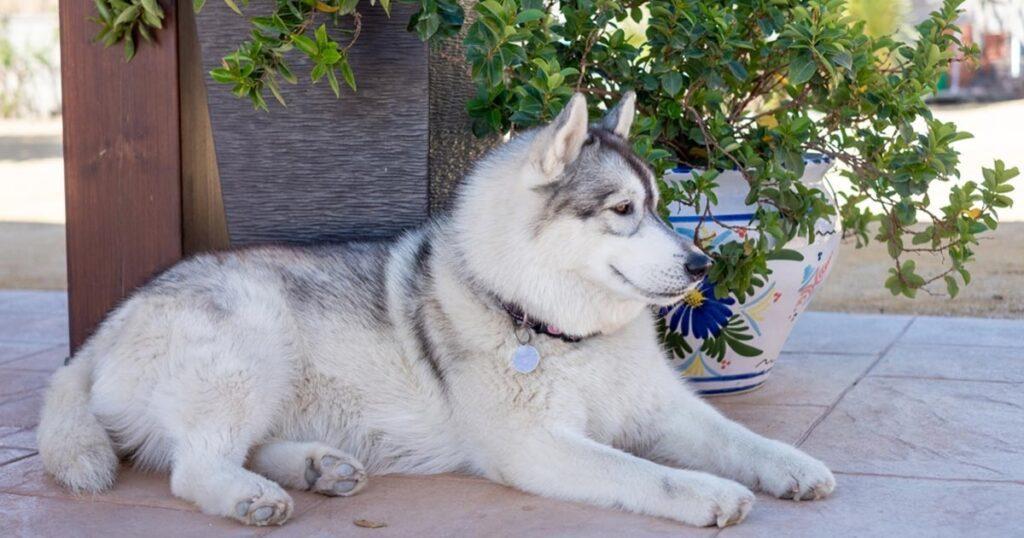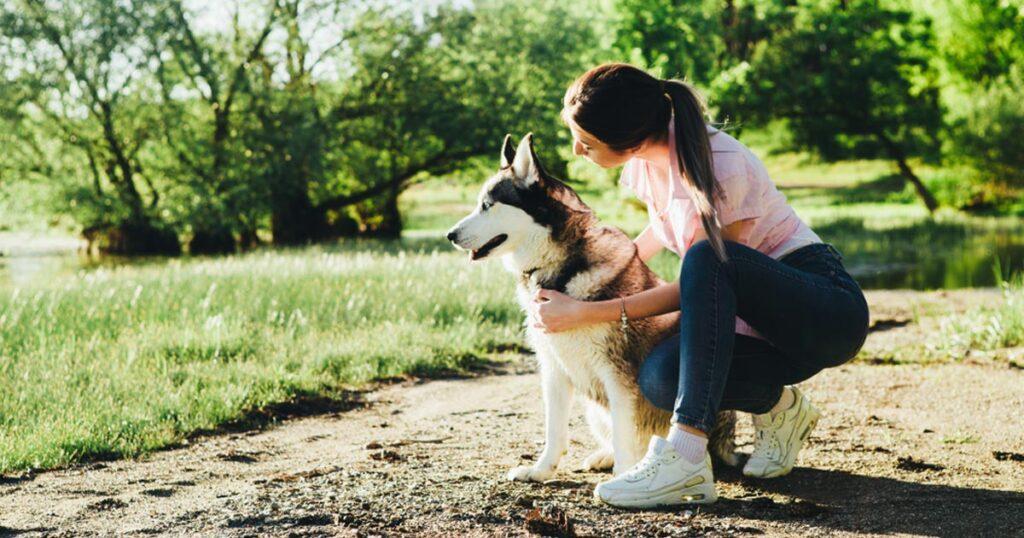To get a Husky to stop barking, provide consistent training and ensure they get enough exercise. Use positive reinforcement to encourage quiet behavior.
Huskies are known for their vocal nature. Proper training and exercise can help reduce excessive barking. These intelligent dogs often bark out of boredom, anxiety, or to communicate. Consistency is key in training them to understand when barking is appropriate.
Use treats and praises to reinforce quiet behavior. Ensure they have plenty of physical and mental stimulation to prevent boredom. Addressing the root cause of their barking will lead to a happier and quieter pet. This approach will foster a better relationship between you and your Husky.
Understanding Husky Barking
Huskies are known for their vocal nature. Understanding why they bark is the first step to controlling it. Knowing the reasons behind their barking can help address the root cause and create a peaceful environment. Let’s delve into the reasons and types of barks to better understand your husky’s behavior.
Reasons Behind Husky Barking
Huskies bark for many reasons, and identifying these can help manage their barking. Here are some common reasons:
- Attention Seeking: Huskies may bark to get your attention, especially if they feel ignored.
- Excitement: They often bark when excited, such as during playtime or when seeing a favorite person.
- Boredom: Lack of mental or physical stimulation can lead to excessive barking.
- Anxiety: Separation anxiety or fear can cause a husky to bark incessantly.
- Territorial Behavior: They may bark to alert you of perceived threats or intruders.
Understanding these reasons can make it easier to address the barking issue. For example, providing more playtime and mental stimulation can reduce boredom-induced barking. Creating a calm environment can help with anxiety-related barking.
Different Types Of Barks And Their Meanings
Huskies have various barks, each with its own meaning. Recognizing these can improve communication with your pet.
Here are some common types of barks:
| Type of Bark | Meaning |
| Short, Sharp Barks | Usually indicates excitement or playfulness. |
| Continuous Barking | Can signal boredom or anxiety, especially if left alone. |
| High-Pitched Barks | Often a sign of fear or distress. |
| Growl Barks | Indicates aggression or a warning to back off. |
By understanding these barks, you can better respond to your husky’s needs. For example, high-pitched barks may require comfort and reassurance, while continuous barking may need more activities to keep them engaged.
Effective Strategies To Reduce Barking
Huskies are known for their vocal nature, which can lead to excessive barking. Finding effective strategies to reduce barking is crucial for a peaceful home. By understanding your Husky’s needs and employing the right techniques, you can minimize this behavior significantly.
Positive Reinforcement Training
Positive reinforcement training is a powerful tool to reduce your Husky’s barking. This method focuses on rewarding good behavior instead of punishing bad behavior. The key is to be consistent and patient.
Here are some steps you can follow:
- Identify the trigger: Determine what causes your Husky to bark. It could be strangers, other animals, or even boredom.
- Ignore the barking: When your Husky starts barking, avoid giving it any attention. This means no eye contact, no talking, and no touching.
- Reward silence: As soon as your Husky stops barking, give it a treat or verbal praise. This reinforces the idea that being quiet brings rewards.
- Use commands: Teach your Husky commands like “quiet” or “hush.” When it barks, use the command and reward silence.
Consistency is key in positive reinforcement training. Over time, your Husky will learn that barking is not rewarded, while silence is.
Providing Sufficient Exercise And Mental Stimulation
Huskies are high-energy dogs that need plenty of exercise and mental stimulation. Lack of these can lead to excessive barking due to boredom or pent-up energy.
Here are some activities that can help:
- Daily walks: Ensure your Husky gets at least one long walk each day. This helps burn off energy and reduces the urge to bark.
- Playtime: Engage in interactive play sessions with toys like balls or frisbees. This keeps your Husky active and engaged.
- Training sessions: Incorporate short training sessions into your daily routine. This provides mental stimulation and reinforces good behavior.
- Puzzle toys: Use puzzle toys that challenge your Husky’s mind. These toys can keep your dog occupied and reduce boredom.
Ensuring your Husky gets enough exercise and mental stimulation can significantly reduce excessive barking. A tired and stimulated Husky is a quieter Husky.
Creating A Calm Environment
Huskies can be vocal dogs. They often bark due to various reasons. One effective way to reduce excessive barking is by creating a calm environment. A calm setting helps your Husky feel secure and relaxed, which can minimize their urge to bark.


Minimizing Triggers
Minimizing triggers plays a key role in reducing your Husky’s barking. Identify what causes your dog to bark. Common triggers include loud noises, unfamiliar visitors, or other animals. Once you know the triggers, you can take steps to reduce their impact.
- Limit Exposure to Noises: Close windows and use curtains to muffle outside noises. Consider playing soft music or white noise to mask disturbing sounds.
- Manage Visitors: Introduce visitors slowly to your Husky. Create a safe space where your dog can retreat if they feel overwhelmed.
- Control Sightlines: Block your dog’s view of the street with frosted windows or barriers. This prevents barking at passersby or other animals.
Using a table can help track the triggers and solutions:
| Trigger | Solution |
| Loud Noises | Close windows, use curtains, play white noise |
| Unfamiliar Visitors | Introduce slowly, create a safe space |
| Street View | Use frosted windows or barriers |
Using Relaxation Techniques
Relaxation techniques can significantly reduce your Husky’s barking. These methods help calm your dog and make them less reactive. Simple practices can make a big difference.
- Regular Exercise: Ensure your Husky gets plenty of physical activity. A tired dog is less likely to bark excessively.
- Consistent Routine: Keep a consistent daily routine. This gives your dog a sense of security and reduces anxiety.
- Calming Toys: Provide calming toys or chew items. These can keep your Husky occupied and reduce stress.
- Massages: Gentle massages can help relax your dog. Focus on their neck and back areas for maximum effect.
Consider the following relaxation techniques for your Husky:
| Technique | Details |
| Exercise | Daily walks, playtime, and mental stimulation |
| Routine | Set feeding, walking, and play times |
| Calming Toys | Interactive toys, chew items |
| Massages | Focus on neck and back for relaxation |
Tools And Techniques
Getting a Husky to stop barking can be a challenge. This vocal breed loves to communicate. Using the right tools and techniques can make a significant difference. Here, we’ll explore effective tools and techniques to help you manage your Husky’s barking.
Use Of Bark Collars And Anti-bark Devices
Bark collars and anti-bark devices are popular tools to manage excessive barking. These devices detect barking and respond with a corrective stimulus. There are different types of bark collars:
- Static Shock Collars: Deliver a mild electric shock when the dog barks.
- Spray Collars: Release a citronella spray to deter barking.
- Ultrasonic Collars: Emit a high-pitched sound that only dogs can hear.
Each type has its pros and cons. Static shock collars are effective but can be harsh. Spray collars are gentler but may not work on all dogs. Ultrasonic collars are humane but might not be effective if the dog is very stubborn.
Anti-bark devices include handheld or stationary units. These devices use ultrasonic sound or vibration to stop barking.
| Type | Pros | Cons |
| Static Shock Collar | Highly effective | Can be harsh |
| Spray Collar | Gentle | Not effective for all dogs |
| Ultrasonic Collar | Humane | May not work on stubborn dogs |
Training Aids And Tools
Training aids and tools are essential for teaching your Husky not to bark. These include:
- Clicker: A clicker is used to mark good behavior. Click and treat when the dog stops barking.
- Treats: High-value treats motivate your dog to follow commands. Use treats to reward quiet behavior.
- Leash and Harness: These help control your dog during training sessions. Use them to guide your dog away from triggers.
Using these tools consistently helps reinforce good behavior. Positive reinforcement is key. Reward your dog for being quiet. Ignore or redirect when they bark.
Training aids can be combined with commands like “quiet” or “enough.” Teach these commands by saying them when the dog stops barking. Then, reward with a treat.
Interactive toys and puzzles also help. They keep your Husky mentally stimulated and reduce boredom-related barking.
| Tool | Purpose |
| Clicker | Marks good behavior |
| Treats | Rewards quiet behavior |
| Leash and Harness | Controls dog during training |
| Interactive Toys | Keeps dog mentally stimulated |
How To Get Husky To Stop Barking (step By Step)
Getting your Husky to stop barking can be a challenge. Huskies are known for their vocal nature. This guide provides a step-by-step process to help you train your Husky to minimize barking. Follow these steps consistently to achieve the best results.
Identify The Cause Of Barking
First, you need to know why your Husky is barking. Is it due to boredom, anxiety, or excitement? Observe your dog’s behavior and take notes. Understanding the cause is crucial for effective training.
Provide Adequate Exercise
Huskies need plenty of exercise. Ensure your dog gets at least an hour of active play each day. A tired Husky is less likely to bark excessively.
Use Positive Reinforcement
Reward your Husky when they stay quiet. Use treats, toys, or praise as positive reinforcement. Consistency is key to reinforcing good behavior.
Teach The “quiet” Command
Train your Husky to respond to the “quiet” command. Start by letting them bark a few times, then say “quiet” and offer a treat when they stop. Repeat this process until they understand the command.
Limit Barking Triggers
Identify and reduce triggers that cause your Husky to bark. If they bark at passersby, close the blinds or use a white noise machine. Reducing triggers helps in managing their barking behavior.
Use Distractions
Distract your Husky when they start barking. Use toys or engage them in a different activity. This helps to break the barking cycle.
Implement A Routine
Establish a daily routine for your Husky. Consistent feeding, walking, and playtimes can reduce anxiety and excessive barking. Dogs thrive on routine and predictability.
| Step | Action |
| 1 | Identify the cause of barking |
| 2 | Provide adequate exercise |
| 3 | Use positive reinforcement |
| 4 | Teach the “quiet” command |
| 5 | Limit barking triggers |
| 6 | Use distractions |
| 7 | Implement a routine |
Consistency And Patience
Huskies are known for their vocal nature. To manage their barking, consistency and patience are essential. Training a Husky to stop barking takes time and dedication. By being consistent and patient, you can effectively communicate with your pet and train them to bark less.
Establishing Clear Communication
Clear communication with your Husky is crucial. They need to understand what you expect from them. Here are some steps to establish clear communication:
- Use Simple Commands: Stick to simple words like “quiet” or “no bark”. This helps your Husky understand what you want.
- Positive Reinforcement: Reward your Husky when they stop barking. Use treats or affection to reinforce good behavior.
- Body Language: Huskies respond well to body language. Use hand signals along with verbal commands.
Consistency in your commands and rewards is key. Huskies are smart and will quickly learn what is expected of them if you are clear and consistent. Avoid mixed signals, as this can confuse your pet and slow the training process.
Using a consistent tone of voice also helps. Huskies can sense your emotions through your voice. Stay calm and assertive to guide them effectively.
Importance Of Consistent Training
Consistent training reinforces the behavior you want to see in your Husky. Here are some key points to keep in mind:
- Regular Training Sessions: Short, frequent training sessions are more effective than long, infrequent ones.
- Set a Routine: Train your Husky at the same time every day. This creates a habit and makes training easier.
- Avoid Inconsistencies: Make sure all family members are on the same page. Mixed signals from different people can confuse your Husky.
Consistency in your training methods helps your Husky understand what is expected. Use the same commands, rewards, and consequences each time. This makes it easier for your Husky to learn and adapt.
Patience is also important. Training a Husky takes time, and there will be setbacks. Stay patient and keep working with your pet. Over time, your Husky will learn to bark less and follow your commands.
Professional Help
Owning a Husky can be a joy, but their persistent barking can sometimes become a challenge. While training at home is essential, sometimes professional help is needed to address this issue effectively. Below are some ways professionals can assist in curbing your Husky’s barking.


Certified Dog Trainers
Certified dog trainers specialize in behavior modification. They use positive reinforcement techniques to teach your Husky when to bark and when to stay quiet. This professional guidance can be invaluable.
Behavioral Specialists
Behavioral specialists focus on the root cause of excessive barking. They analyze your Husky’s environment, routine, and emotional triggers. Based on this analysis, they create a customized plan to reduce barking.
Veterinary Consultations
Sometimes, excessive barking can be due to underlying health issues. A vet can rule out medical problems such as pain, hearing loss, or anxiety, which might contribute to your Husky’s barking.
Doggy Daycare
Doggy daycare can offer a social and stimulating environment for your Husky. This reduces boredom and anxiety, which are common causes of excessive barking. Trained staff supervise interactions and provide mental and physical exercises.
Obedience Classes
Obedience classes teach your Husky basic commands and social skills. These classes can significantly reduce barking by promoting better behavior overall. Trainers guide you and your dog through structured exercises.
| Professional Help | Benefits |
| Certified Dog Trainers | Behavior modification through positive reinforcement |
| Behavioral Specialists | Customized plans based on root causes |
| Veterinary Consultations | Identifying and treating medical issues |
| Doggy Daycare | Social stimulation reduces boredom and anxiety |
| Obedience Classes | Improved behavior through structured training |
Frequently Asked Questions
How Do I Stop My Husky From Barking?
Train your Husky with consistent commands and rewards. Provide regular exercise and mental stimulation. Address any anxiety or boredom. Use positive reinforcement to encourage quiet behavior. Seek help from a professional trainer if needed.
Why Do Huskies Bark So Much?
Huskies bark a lot due to their high energy levels and need for attention. They are vocal and expressive dogs. Proper training and exercise can help manage excessive barking.
Can You Train A Husky To Be Quiet?
Yes, you can train a Husky to be quiet. Use positive reinforcement, consistent commands, and reward calm behavior. Patience and repetition are key.
How Do You Stop Nuisance Barking?
To stop nuisance barking, consistently train your dog with positive reinforcement. Provide mental and physical stimulation. Use commands like “quiet” and reward calm behavior. Avoid reinforcing barking by giving attention. Consider consulting a professional trainer for persistent issues.
Conclusion
Training your husky to stop barking takes time and patience. Consistency and positive reinforcement are key. Be sure to address their needs and triggers. With dedication, you can achieve a quieter, happier home. Practice these tips and enjoy a well-behaved husky.
Your effort will surely pay off.


Meet Jarred, the heart and soul behind HukyCentre. With a deep affection for furry friends, he pours his passion into every word he writes. His genuine love for dogs shines through in his engaging and informative content. As a dedicated dog enthusiast, Jarred’s goal is to share valuable insights and tips that resonate with fellow dog lovers. Join Jarred on the journey as he celebrates the joy and companionship that dogs bring into our lives.



